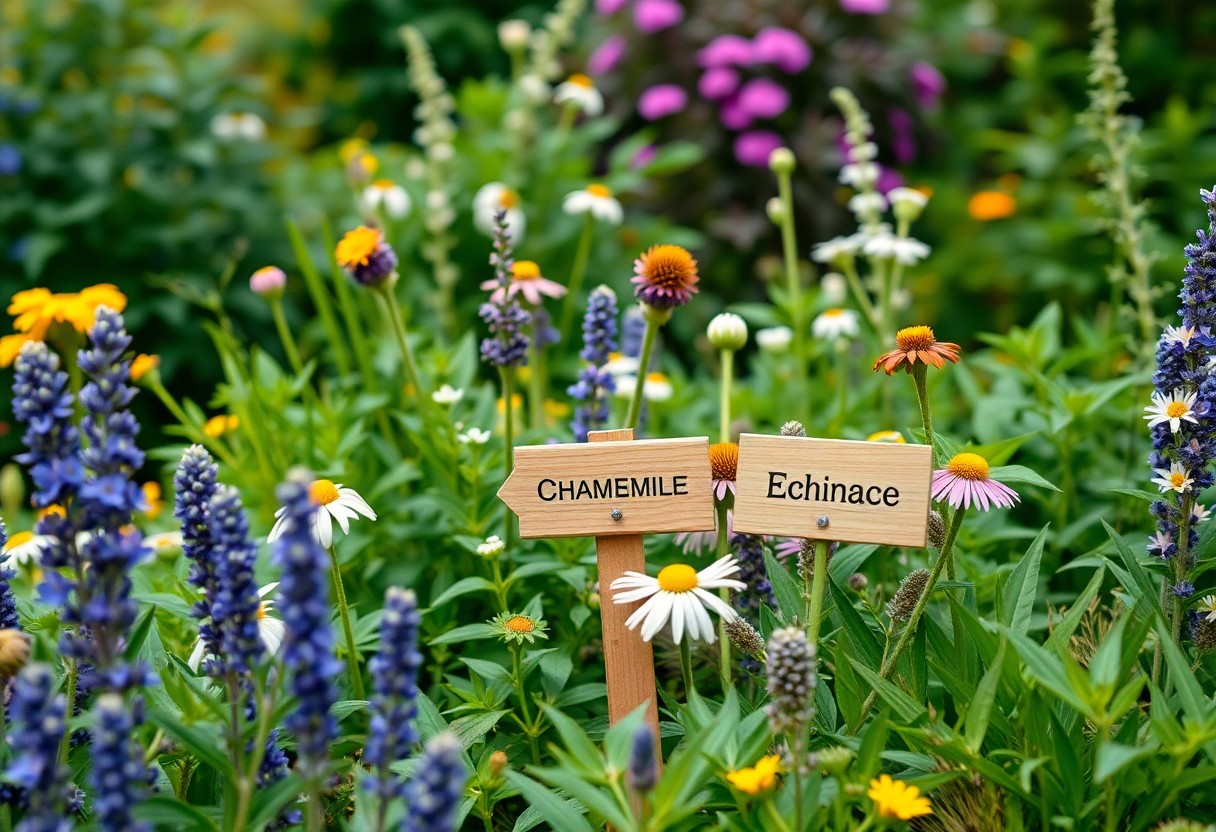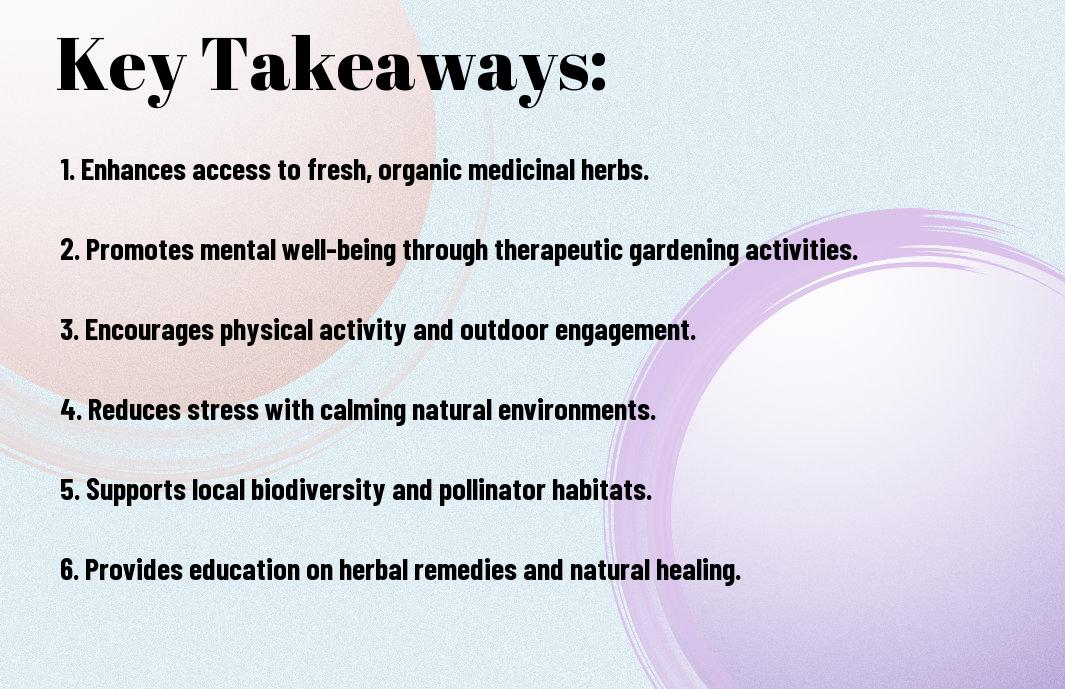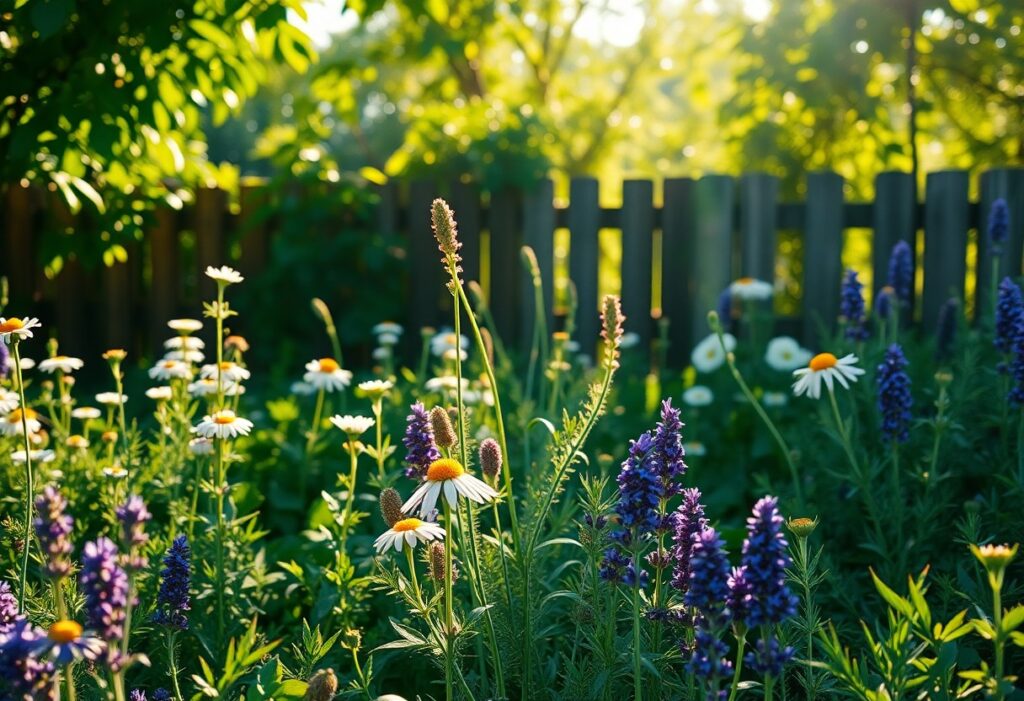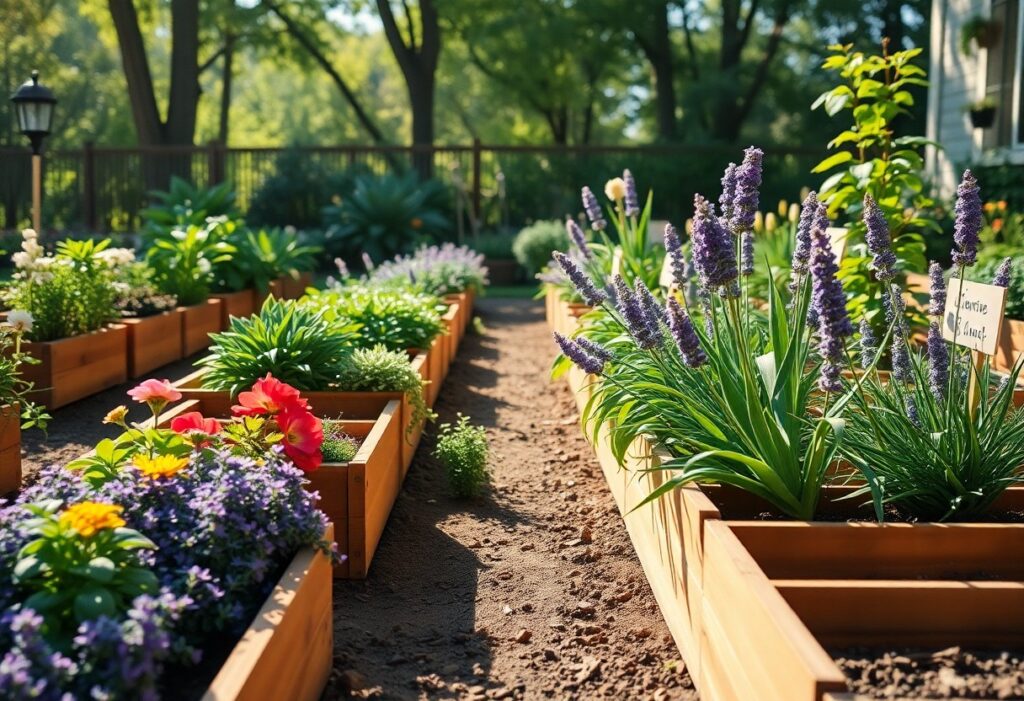Over the years, cultivating a medicinal garden has gained recognition for its numerous health benefits. By growing your own medicinal plants, you can harness the power of nature to enhance your well-being and address various ailments. This blog post will guide you through the advantages of creating your own garden, including improved mental health, access to natural remedies, and the satisfaction of nurturing plants that can directly benefit your health. Dive in to discover how you can transform your outdoor space into a natural pharmacy, promoting a healthier lifestyle for you and your loved ones.

Understanding Medicinal Plants
As you explore into medicinal plants, it’s crucial to appreciate their deep-rooted significance across cultures and time periods. Historically, you will find that these plants have been utilized by various civilizations for their healing properties, often forming the backbone of traditional medicine systems. Ancient texts, such as those from Chinese, Egyptian, and Indian cultures, elucidate their extensive use, showcasing the knowledge and practices that have been passed down through generations. This historical perspective not only enriches your understanding of these plants but also highlights their enduring value in promoting health and well-being.
Historical Significance
Historical records illustrate that your ancestors relied heavily on herbal remedies, employing plants such as willow bark for pain relief, or garlic for its antimicrobial properties. You can see that many of the modern pharmaceuticals we use today are derived from compounds found in these plants. For example, the use of quinine, derived from the bark of the cinchona tree, transformed how malaria was treated. This legacy of utilizing natural resources for medicinal purposes often reflects a profound understanding of nature that many cultures possessed long before the advent of modern medicine.
Modern Applications
To illustrate the continued relevance of medicinal plants in today’s world, you should consider how they are increasingly incorporated into holistic health practices. The modern resurgence in herbal medicine aligns with a shift toward natural remedies and preventative health measures. You may find adaptogens like ashwagandha and rhodiola being celebrated for their ability to help the body adapt to stress, or sources like turmeric and ginger, which are lauded for their anti-inflammatory properties. This trend marks a growing appreciation for the efficacy of nature-based treatments in complementing conventional medical approaches.
Significance lies in the fact that you can integrate these practices into your health regimen, so they effectively work alongside traditional medicine. By educating yourself about the properties and uses of common medicinal herbs, you become empowered to make informed decisions about your health. Whether you’re brewing teas from chamomile for relaxation, using echinacea to bolster your immune system, or creating tinctures for specific ailments, the knowledge of medicinal plants can serve as a powerful tool in your wellness arsenal.

Key Health Benefits
If you were to cultivate a medicinal garden, you would open up a wealth of health benefits right at your doorstep. These gardens not only provide fresh herbs and plants that can be used in home remedies but also promote a healthier lifestyle through increased access to natural ingredients. By incorporating medicinal plants into your daily routine, you could potentially reduce reliance on pharmaceutical products, leading to better overall health and fewer side effects often associated with synthetic medications.
Physical Health Improvements
On engaging with a medicinal garden, you could experience various physical health improvements. Many medicinal plants boast anti-inflammatory, antioxidant, and immune-boosting properties that can enhance your body’s functionality. For instance, growing herbs like turmeric and ginger can help in alleviating pain and supporting digestion. Additionally, harvesting and preparing these fresh ingredients can encourage a more balanced diet, packed with nutrients that improve your physical wellness.
Mental Health Enhancements
One of the remarkable aspects of tending to a medicinal garden is its potential to positively influence your mental health. The act of gardening can reduce stress and anxiety levels, providing you with a serene environment to unwind and focus on the present. As you nurture your plants, you may find a sense of purpose and satisfaction, contributing to your overall mental well-being.
Health benefits extend beyond just physical improvements; gardening can foster mindfulness and creativity, allowing you to connect deeply with nature. You could also find that interacting with plants and caring for them gives a sense of accomplishment and boosts your mood. Engaging in such activities can help you detach from daily stresses, promoting a healthier mindset and emotional balance.
Essential Medicinal Herbs for Your Garden
Keep in mind that cultivating a medicinal garden requires selecting the right herbs that can provide a plethora of health benefits. Start with commonly used herbs that have earned their place in your kitchen and medicine cabinet. These plants not only enhance the flavors of your meals but also serve as natural remedies. Incorporating herbs such as basil, thyme, and rosemary can offer medicinal properties ranging from anti-inflammatory effects to support for digestive health. You can easily grow them in pots or directly in the soil, making them accessible and convenient additions to your garden.
Commonly Used Herbs
About these herbs, it’s fascinating how they blend seamlessly into your culinary practices while also supporting your overall well-being. For example, peppermint is not only a delightful flavor enhancer for teas and desserts but also effective in alleviating headaches and digestive issues. Similarly, chamomile, often enjoyed as a soothing tea, can aid in promoting relaxation and improving sleep quality. By including these herbs in your garden, you create a resource for both culinary and therapeutic uses that can really enrich your life.
Rare and Considered Gems
Across the world, certain lesser-known herbs have gained attention for their unique health benefits and applications. These rare gems, such as ashwagandha or mullein, may not be as familiar as the common herbs, but they hold significant healing properties. Ashwagandha is celebrated for its adaptogenic properties, aiding in stress reduction and energy enhancement, while mullein can be quite effective as a respiratory aid. Planting such herbs in your garden enhances its diversity and provides you with exceptional natural solutions that might not be readily available in mainstream stores.
Considering the addition of rare herbs to your medicinal garden can unlock a world of alternative health options. Integrating plants like St. John’s wort, known for its mood-lifting capabilities, or calendula, prized for its skin-healing properties, could transform your garden into a holistic health retreat. While some of these herbs may require specialized growing conditions, the investment in your garden will pay off in the form of unique remedies tailored to your personal health needs. By embracing these rare herbs, you’ll not only expand your gardening experience but also empower your self-care routine with natural solutions that often go unnoticed in conventional practices.
Designing Your Medicinal Garden
Despite the many benefits a medicinal garden can offer, creating a space that is both functional and aesthetically pleasing requires thoughtful design. You’ll want to start by identifying which plants are most beneficial for your specific health needs, as well as considering how much space you have to work with. Laying out a plan that includes a variety of herbs, flowers, and plants with different medicinal properties not only enhances the experience but also increases the potential for healing. A well-framed garden can complement your home and lifestyle while serving as a sanctuary for health and wellness.
Planning Your Space
Your first step in planning your medicinal garden is to assess the available space. Consider whether you will use raised beds, containers, or simply plant directly in the ground. Each option has its own set of benefits, like easier access for maintenance with raised beds or the flexibility of container gardening. Think about the accessibility of your garden; it should be close enough for you to visit frequently and enjoy the process of tending to your plants. Layout the garden in a way that makes it easy to navigate and allows you to harvest or recycle plant material with ease.
Soil and Sunlight Considerations
To create a thriving medicinal garden, the quality of your soil and the amount of sunlight in your garden will play significant roles. Begin by testing your soil’s pH and nutrient levels, as these will heavily influence plant growth. Many medicinal plants prefer well-draining soil enriched with organic matter. Consider adding compost or mulch to improve soil quality and moisture retention. In terms of sunlight, most medicinal plants require at least six hours of direct sunlight per day, so pay close attention to the orientation of your garden and the placement of your plants.
In fact, understanding the needs of your plants is important to their survival and efficacy. Different plants may have varying requirements regarding sunlight exposure and moisture levels. By grouping plants with similar needs together, you can foster a more harmonious garden ecosystem. Take time to observe the sunlight patterns throughout the day to determine the optimal locations for your plants; this investment in planning will pay off in the health and vitality of your medicinal garden.
Maintenance and Care
Now that you have established your medicinal garden, it is crucial to focus on its maintenance and care to ensure optimal growth and health of your plants. Regular attention to watering, fertilizing, and pest management will help you cultivate a vibrant garden that provides you with the healing benefits you are seeking. You should allocate some time each week to monitor the progress of your plants and adjust your care routine as needed. With consistent maintenance, your medicinal garden can thrive and continue to deliver its therapeutic properties.
Watering and Fertilizing
Above all, understanding the watering and fertilizing needs of your medicinal plants is vital for their growth. Each plant species has its own requirements, so it’s important to research the specific needs of the herbs and plants in your garden. Generally, most medicinal plants prefer well-draining soil and should be watered deeply but infrequently. Just ensure that the soil remains slightly moist; overwatering can lead to root rot, which can devastate your garden.
In addition to watering, providing the right nutrients through fertilization will help your plants flourish. You may opt for organic options such as compost or manure, which are excellent for enriching the soil without introducing harmful chemicals. Applying a balanced organic fertilizer during the growing season will support your plants in producing their crucial oils and compounds, ultimately boosting their medicinal properties.
Pest Management
By proactively managing pests in your medicinal garden, you can protect your plants from damage and maintain a healthy ecosystem. Regular inspections will help you identify any infestations early, allowing you to take appropriate action before they become a larger issue. Utilizing a combination of organic pest control methods, such as insecticidal soap or neem oil, can effectively minimize pest populations without harming beneficial insects.
This integrated approach not only helps mitigate pest damage but also promotes biodiversity in your garden. Companion planting, for example, can deter harmful insects while attracting beneficial predators that keep your garden free from pests. Additionally, cultivating a welcoming environment for wildlife, such as birds and bats, can contribute to natural pest control. By being vigilant and adopting sustainable practices in pest management, you can nurture a harmonious environment that supports the overall health of your medicinal garden.
Integrating a Medicinal Garden into Daily Life
To truly benefit from a medicinal garden, you should aim to integrate it into your daily routine. Start by designating a space in your kitchen or dining area to display your freshly picked herbs. Not only will this beautify your home, but it will also serve as a constant reminder to utilize these natural remedies in your culinary creations and wellness practices. Consider creating an inventory of the herbs you grow, noting their uses and benefits, which will help you make informed decisions when incorporating them into your diet and lifestyle.
Incorporating Herbs into Cooking
Against the backdrop of modern cooking, integrating herbs from your medicinal garden can enhance both the flavor and health benefits of your meals. Instead of relying solely on processed spices, leverage the freshness of your homegrown herbs. You can easily add them to salads, stews, and marinades, turning everyday meals into powerful health boosters. For example, basil and oregano not only uplift the taste profile of Italian dishes but also offer anti-inflammatory benefits. When you include your garden’s bounty in your recipes, you are not just nourishing your body but also embracing the therapeutic potential of these plants.
Herbal Remedies and Preparations
Into natural health, herbal remedies derived from your garden can offer a plethora of benefits. From soothing teas made with chamomile to tinctures crafted from echinacea, each herb has its unique application and can be used to address various ailments. You can experiment with different preparation methods, such as drying herbs for later use or infusing oils with healing properties. This hands-on approach not only deepens your understanding of herbal medicine but also empowers you to treat minor ailments at home.
Into this exploration of herbal remedies, consider diving deeper into the world of natural health. By learning about the specific properties of each herb in your garden, you can tailor your remedies to suit your individual health needs. Creating a simple herbal first-aid kit is an excellent project; include dried herbs for teas, infused oils for topical use, and salves for skin irritations. These preparations can easily become a part of your everyday life, allowing you to harness the power of plants right from your backyard.
Summing up
Summing up, cultivating a medicinal garden offers you a multitude of health benefits that extend beyond physical wellness. By incorporating various medicinal plants into your garden, you not only enhance your knowledge of natural remedies but also take an active role in your health care. These plants can serve as alternatives to conventional medications for minor ailments, allowing you to tap into the power of nature for your healing practices. Additionally, spending time tending to your garden can reduce stress levels, improve your mood, and provide a sense of accomplishment, all of which contribute positively to your mental well-being.
Moreover, a medicinal garden encourages you to adopt a healthier lifestyle by inspiring you to integrate the use of fresh herbs and plants into your meals, enhancing their nutritional value. As you develop a deeper connection with your garden, you’ll likely become more attuned to the benefits of holistic health and wellness. With each harvest, you’re not only improving your physical health but also nurturing your mind and spirit, creating a truly enriching and rewarding experience that goes hand in hand with your overall well-being.
FAQ
Q: What types of plants should I include in a medicinal garden?
A: A medicinal garden can feature a variety of plants known for their healing properties. Common choices include herbs like basil, mint, chamomile, and echinacea, which are praised for their anti-inflammatory and soothing effects. Additionally, you might consider planting calendula, known for its skin-healing qualities, or rosemary, which can aid digestion. It’s important to select plants that are suited to your climate and that you find personally beneficial.
Q: How can a medicinal garden improve my overall health?
A: Engaging with a medicinal garden can enhance your health in numerous ways. Firstly, gardening itself is a form of physical exercise, helping to improve cardiovascular health and reduce stress. Secondly, many medicinal plants have been shown to support the immune system, reduce inflammation, and aid in digestion, among other benefits. Additionally, having easy access to fresh herbs can encourage healthier cooking and eating habits.
Q: What is the best way to cultivate and maintain a medicinal garden?
A: Cultivating a medicinal garden requires attention to soil quality, sunlight, and watering needs. Start by assessing your planting area for adequate sunlight and good drainage. Use organic compost to enrich the soil, and plan for companion planting, which can enhance growth and deter pests. Regular watering and pruning can help ensure healthy plants. Observing your plants for signs of disease or pests is also important to maintain the garden’s health.
Q: Are there specific techniques for harvesting medicinal plants?
A: Yes, harvesting medicinal plants should be done thoughtfully to preserve the potency of their active compounds. Generally, it’s best to harvest herbs in the morning when their important oils are most concentrated. Use clean, sharp tools to avoid damaging the plants, and take care not to remove more than a third of the plant at a time. Different plants may have specific harvesting times—flowers, leaves, and roots may all be harvested differently, so research your selected plants for optimal practices.
Q: Can I use medicinal plants for homemade remedies, and if so, how?
A: Absolutely! Many people create homemade remedies using the plants from their medicinal gardens. Fresh herbs can be used to make teas, tinctures, or topical salves. For instance, steeping chamomile flowers in hot water creates a soothing tea, while crushed calendula petals can be infused in oil to create a healing salve. However, it’s important to research the properties and proper preparation methods of each plant to ensure safety and effectiveness in your homemade remedies.


